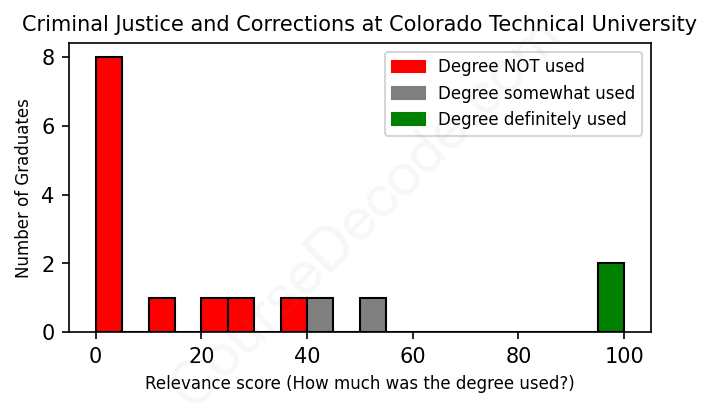
First, some facts. Of the Criminal Justice and Corrections graduates from Colorado Technical University we've analyzed , here's how many have used (or NOT used) their degree in their career:

These are estimates based on AI analysis of 16 LinkedIn profiles (see below).
The verdict? Horrible! Overall, with an average relevance score of 24%, Criminal Justice and Corrections graduates from Colorado Technical University have an exceptionally lower likelihood (-43%) of finding work in this field compared to the average graduate across all fields:
And for comparison, here's the chart for all profiles we've looked at across all degrees.
Also, after graduating, only 18% of these graduates have pursued further education other than another Bachelor's degree (such as a Masters degree or other), compared to the average across all profiles of 35%. This suggests a Bachelors degree is enough for most Criminal Justice and Corrections graduates, and it's normal to look for work straight after graduation.
See the details:
|
Relevance score: 0% We think this person has NOT gone into a career related to their degree. We think this person has NOT gone into a career related to their degree.
DEGREE INFOGraduated in 2018 from Colorado Technical University with a Bachelor of Applied Science - BASc in Criminal Justice and Corrections. No other secondary education since. JOB HISTORY SINCE GRADUATIONsecurity / Door man Howl at the Moon Jul 2019 - Present ABOUTNo information provided. |
The top 10 most common jobs done by the graduates we've analyzed (ranked most common to least) are:
Looking at the LinkedIn profiles of graduates from Colorado Technical University with degrees in Criminal Justice and Corrections, it seems like the most common types of jobs these individuals have landed are in areas that don’t really tap into their specific education. A lot of folks ended up in roles like administrative positions at banks, healthcare settings, or customer service jobs—such as being a personal shopper or a clerk—that are pretty far from the criminal justice field. There’s also a noticeable number of roles involving medical records and management, which similarly don’t involve the kind of criminal justice skills they learned in school.
However, there are some noteworthy exceptions. A few graduates did land jobs that really mesh well with their degrees, like working as a Chief of Security or a Deputy Warden, where their education is definitely relevant. Others, like those in Financial Crimes Compliance, applied their criminal justice insights to the finance world, which is super beneficial considering the rise in financial crime. But overall, it appears that many of these graduates are in roles that either completely diverge from Criminal Justice and Corrections or only lightly connect. It’s a curious mix, and it kind of highlights how a criminal justice degree can lead you into all sorts of job paths—some expected, but many that feel a bit off the mark!
Here is a visual representation of the most common words in job titles for Criminal Justice and Corrections graduates (this is across all Criminal Justice and Corrections graduates we've analyzed, not just those who went to Colorado Technical University):

When looking at the career trajectories of graduates from Colorado Technical University with degrees in Criminal Justice and Corrections, it’s clear that many have found themselves in a variety of roles, but not all of them are directly related to their field of study. For many, the first job after graduating tends to be somewhat related to criminal justice or public safety, such as positions within juvenile assessment centers, security roles, or probation and parole services. However, it seems that after a few years, quite a few have shifted into roles that stray further from traditional criminal justice paths, including positions in healthcare administration, finance, or even teaching.
As these graduates move into the 5- to 10-year mark, there's a mix of successes and diversions. Some have effectively climbed the ladder within their fields, like the individual who went from Chief of Security to Deputy Warden. Others, however, have ventured into completely unrelated careers, such as those working as life coaches, in culinary management, or in the tech industry. This suggests that while some graduates have secured stable and relevant careers in criminal justice, many might feel the need to explore other avenues, which may not align with their original degree. Overall, it seems like a mixed bag—there are definitely success stories, but also quite a few grads who haven’t stuck with criminal justice roles long-term.
Getting a Bachelor’s degree in Criminal Justice and Corrections is generally considered to be on the easier side compared to some other fields, and that applies to programs like the one at Colorado Technical University as well. You'll cover topics like criminal law, ethics, and the justice system, but the coursework often leans more towards theory and social science rather than heavy math or science. That said, it can get a bit more challenging if you dive into research projects or advanced analysis, but overall, if you're motivated and keep up with your studies, you should find it manageable. Plus, it's designed to be accessible to a wide range of students, so as long as you engage with the material, you should do just fine!
Most commonly, in the LinkedIn profiles we've looked at, it takes people 2 years to finish a Bachelor degree in Criminal Justice and Corrections.
Looking at these graduates from Colorado Technical University, it seems like they've had a mixed bag when it comes to their earnings, and some of them might not be raking in the big bucks. For instance, the first grad has jumped around a lot—but positions like “Personal Shopper” and “Self-Employed” probably aren't the highest earners, you know? On the other hand, some grads have taken on impressive roles, like a “Deputy Warden” or a “Senior Support Analyst,” which hint at decent salaries. Overall, it’s clear that while a few might be doing pretty well in their careers, others are still figuring things out, and some may not be pulling in quite as much money as you’d expect for a degree in Criminal Justice and Corrections.
Here is a visual representation of the most common words seen in the "about" section of LinkedIn profiles who have a Bachelor degree in Criminal Justice and Corrections (this is across all Criminal Justice and Corrections graduates we've analyzed, not just those who went to Colorado Technical University). This may or may not be useful:

Here are all colleges offering a Bachelor degree in Criminal Justice and Corrections (ordered by the average relevance score of their Criminal Justice and Corrections graduates, best to worst) where we have analyzed at least 10 of their graduates:
| College | Score | Count |
|---|---|---|
 American Military University American Military University
|
52 | 13 |
 Bridgewater State University Bridgewater State University
|
50 | 13 |
 University of Central Florida University of Central Florida
|
47 | 14 |
 University of North Texas University of North Texas
|
47 | 14 |
 University of Phoenix University of Phoenix
|
41 | 23 |
 University of Cincinnati University of Cincinnati
|
41 | 12 |
 Sam Houston State University Sam Houston State University
|
35 | 22 |
 John Jay College (CUNY) John Jay College (CUNY)
|
35 | 12 |
 Ferris State University Ferris State University
|
34 | 14 |
 Florida International University Florida International University
|
31 | 17 |
 Liberty University Liberty University
|
31 | 10 |
 California State University-Sacramento California State University-Sacramento
|
24 | 14 |
 Colorado Technical University Colorado Technical University
|
24 | 16 |